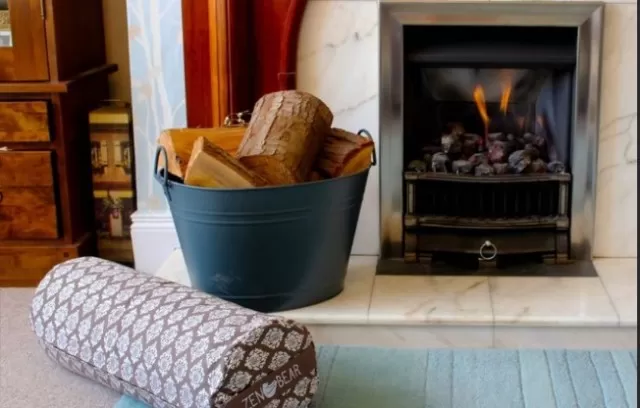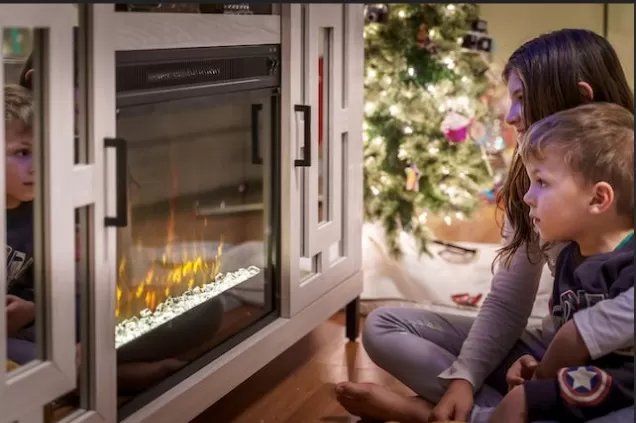Gas Fireplace Odor Solved: Unraveling the 3 Possible Causes. Experiencing a gas smell in a gas fireplace may not always indicate a serious issue, yet maintaining a cautious mindset is advisable. By familiarizing oneself with the causes behind this phenomenon and implementing safety measures, one can ensure a secure and pleasant fireplace experience.
When a gas fireplace is initially turned on or after a period of inactivity, it is common to detect a faint gas odor. This occurrence arises from the gas flow necessary for the fireplace to operate effectively. In most cases, this odor dissipates within approximately 10 minutes, making it a temporary and harmless occurrence.
To stay safe and maintain peace of mind, it is beneficial to understand the factors contributing to the gas odor. Additionally, following these safety guidelines is recommended:
Understanding Gas Fireplace Odors: Initial Activation and Cautionary Considerations

When a gas fireplace is ignited for the first time, it is perfectly normal to detect a distinct odor.
Homeowners should exercise caution and remain vigilant about any gas smells within their living spaces, as gas leaks can pose significant risks, including potential fatality. However, similar to the occurrence of a burning scent upon activating a furnace, homeowners may also notice a slight gas odor permeating their house when they initially switch on a gas fireplace that has been inactive for some time.
This smell may persist for a few minutes even after the fireplace is operational. As long as the odor is present solely during fireplace usage and gradually diminishes within approximately 10 minutes, there is no need for alarm.
Enhancing Fireplace Ventilation and Prioritizing HVAC Maintenance for Odor Management
To minimize any persistent gas odors surrounding a gas fireplace, it is essential to establish proper ventilation and adhere to regular HVAC cleanings.
While the smell of gas may not always indicate danger, it is undeniably unpleasant. By optimizing ventilation in the vicinity of the fireplace, the gas odor can dissipate more rapidly. Although many gas fireplaces lack traditional chimneys, they should possess a vent system designed to exhaust fumes outdoors, rather than allowing them to infiltrate the living space.
Homeowners are encouraged to have their gas fireplaces periodically inspected to ensure that the vents remain unobstructed and are functioning correctly.
If the house continues to emit a gas odor despite the absence of a leak, it is plausible that the air filters in the home are overdue for replacement. Therefore, it is advisable to uphold regular maintenance of the HVAC system, including periodic cleaning, to promote optimal Air Quality and mitigate any lingering smells.
By prioritizing effective ventilation and conscientious HVAC upkeep, homeowners can alleviate gas odors originating from their gas fireplaces and enhance the overall comfort and safety of their living environment.
Amplifying Existing Odors: The Interaction between Gas Fireplaces and Household Smells

Beyond emitting its own distinct gas odor, a propane gas fireplace has the potential to intensify other smells present within the home.
The presence of a gas flame can enhance the prominence of existing odors already lingering in the air. As fire requires oxygen to sustain itself, this oxygen may contain impurities that contribute to the overall air quality.
When these impurities come into contact with the flames emanating from the fireplace, they can produce a more pronounced and noticeable smell.
Moreover, during periods when the gas fireplace remains inactive, dust particles and other debris often accumulate within its confines.
When the fireplace is subsequently ignited, these accumulated particles are subjected to the heat and begin to burn. This burning process can result in a distinct odor reminiscent of burnt hair, which may become noticeable to homeowners.
To mitigate the impact of these intensified odors, homeowners have a couple of options.
Firstly, utilizing an air purifier can help to filter out impurities and improve the overall air quality within the home. Additionally, regularly changing the filters within the HVAC system can contribute to reducing lingering odors and maintaining a fresher environment.
By being aware of the potential interaction between a gas fireplace and household smells, homeowners can take proactive measures to minimize and manage any odor-related concerns, thus fostering a more pleasant living atmosphere.
Detecting a Potential Gas Leak: Identifying Odors when the Gas Fireplace is Turned Off
While it is normal to perceive a mild gas odor when a gas fireplace is operational, as the gas supply is required for its functioning, consistently detecting the smell of sulfur or gas when the fireplace is not in use could signify a potential gas leak.
In such instances, it is crucial to take immediate action to ensure safety.
Firstly, it is essential to turn off the gas supply to the fireplace and then proceed to ventilate the room by opening windows and doors to allow fresh air to circulate.
If the odor persists even after airing out the room, it becomes imperative to investigate further for additional signs of a gas leak. These indicators may include hissing sounds near the gas lines, unexpectedly high gas bills, the distinct smell of rotten eggs (which is added to natural gas for easy detection), or even signs of withering or dying plants near the gas lines.
In addition, it is wise to ensure that the carbon monoxide detector in the home is functioning correctly.
Carbon monoxide detectors are crucial as they can detect the presence of gas leaks, including potentially harmful carbon monoxide emissions. Regularly checking and maintaining the functionality of these detectors can aid in promptly identifying and addressing any gas leak situations.
If any signs of a gas leak are observed or suspected, it is vital to prioritize personal safety and evacuate the premises immediately.
Contact the gas company or a qualified professional to address the issue promptly and ensure a thorough inspection and repair of the gas fireplace or gas lines.
Remember, promptly addressing potential gas leaks is paramount for the well-being of everyone in the household and should never be taken lightly.
Urgency and Professional Intervention: Dealing with Potential Gas Leaks

Gas leaks are serious and potentially hazardous situations that demand immediate attention from professionals.
If there is any suspicion of a gas leak in relation to a fireplace, or if individuals in the household are experiencing symptoms associated with gas exposure, such as dizziness or headaches, it is crucial to prioritize health and safety over any concerns of a false alarm. It is always better to err on the side of caution in such instances.
When facing the possibility of a gas leak, it is imperative to take appropriate precautions and swiftly respond.
Contact emergency services by dialing 911 or reach out to the gas company to report the situation and request their expertise. Meanwhile, evacuate all occupants from the house, including pets, and gather at a safe location outside the premises until professional assistance arrives.
Once the professionals have assessed and resolved the situation, ensuring it is safe to reenter the home, it is advisable to have a qualified technician inspect the gas fireplace before using it again.
This thorough examination will help identify any potential gas valve leaks or blockages within the vent system. By doing so, the technician can rectify any issues and ensure the fireplace is restored to a safe and functional state.
It is important to remember that gas leaks pose a significant risk to health and safety.
Taking swift and decisive action, involving professional assistance, and prioritizing proper inspection and repairs are essential steps in mitigating the potential dangers associated with gas leaks and ensuring the well-being of everyone in the household.
*The information is for reference only.